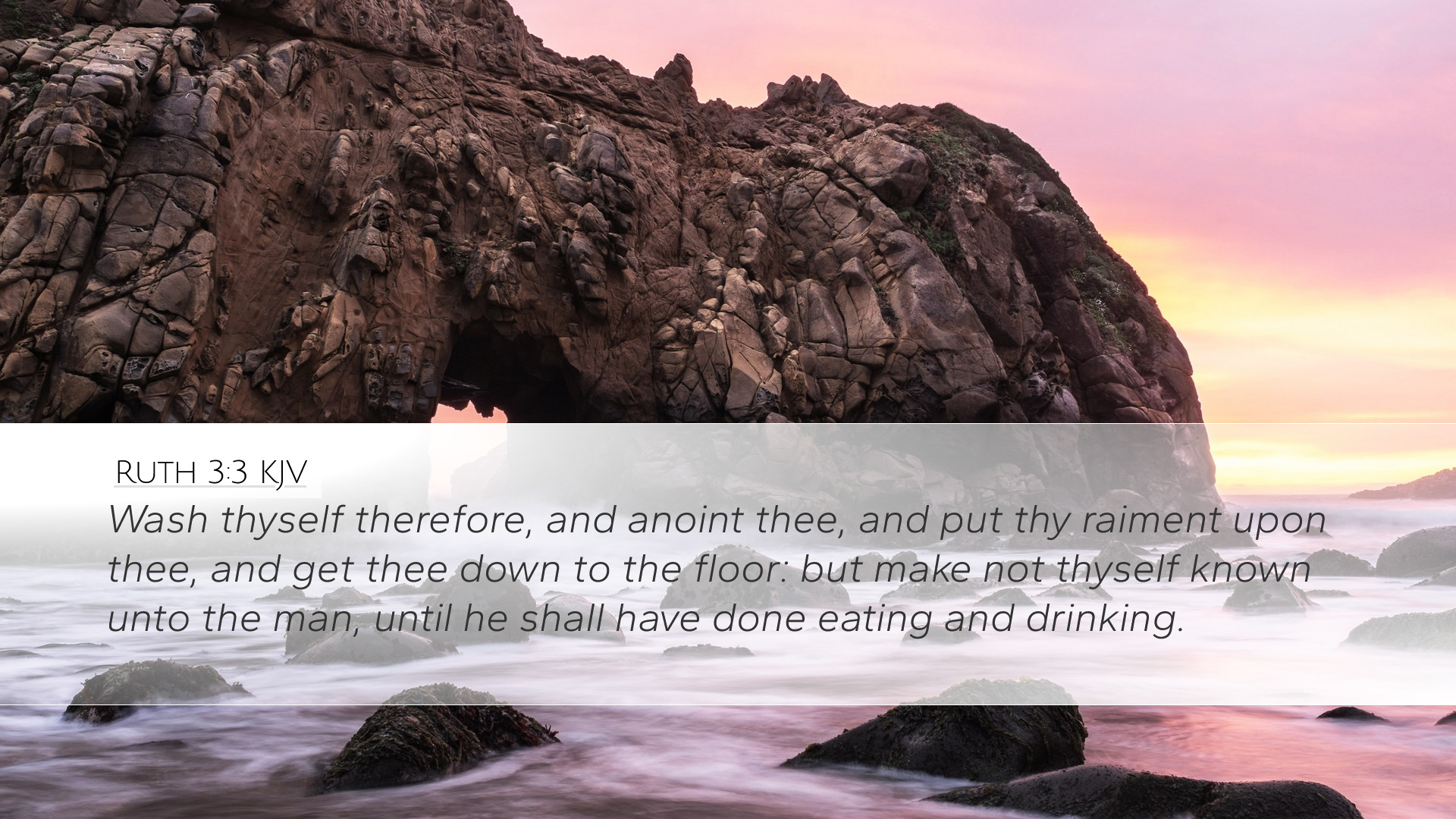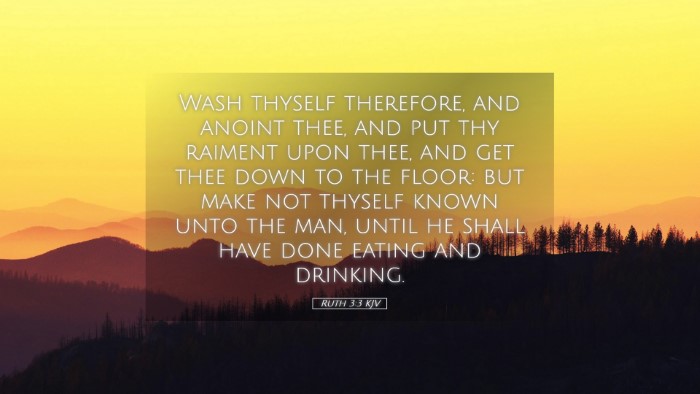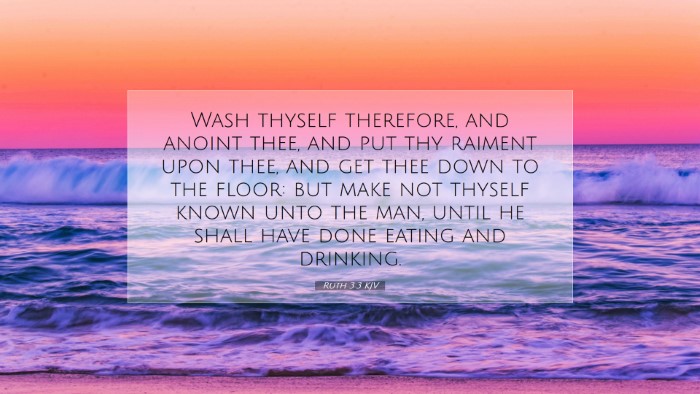Old Testament
Genesis Exodus Leviticus Numbers Deuteronomy Joshua Judges Ruth 1 Samuel 2 Samuel 1 Kings 2 Kings 1 Chronicles 2 Chronicles Ezra Nehemiah Esther Job Psalms Proverbs Ecclesiastes Song of Solomon Isaiah Jeremiah Lamentations Ezekiel Daniel Hosea Joel Amos Obadiah Jonah Micah Nahum Habakkuk Zephaniah Haggai Zechariah MalachiRuth 3:3
Ruth 3:3 KJV
Wash thyself therefore, and anoint thee, and put thy raiment upon thee, and get thee down to the floor: but make not thyself known unto the man, until he shall have done eating and drinking.
Ruth 3:3 Bible Commentary
Commentary on Ruth 3:3
Verse: Ruth 3:3 - "Wash yourself therefore, and anoint yourself, and put on your best garment, and go down to the threshing floor: but make not thyself known unto the man, until he shall have done eating and drinking."
Introduction
The Book of Ruth, a beautiful narrative nestled within the Old Testament, is rich in theological insight and personal application. In Ruth 3:3, we encounter a pivotal moment in the story where Naomi instructs Ruth on how to approach Boaz. This passage presents not only practical advice but also spiritual symbolism pertinent to the lives of believers.
Contextual Background
The events of Ruth transpire during the time of the judges, a period marked by social unrest and moral decay in Israel (Judges 21:25). Ruth, a Moabite widow, has committed herself to Naomi, her Israelite mother-in-law, demonstrating unwavering loyalty and faith (Ruth 1:16-17). The narrative reaches a critical juncture as Naomi seeks to secure a future for Ruth amidst the cultural practices of Israel.
Exegesis of Ruth 3:3
Naomi's instructions to Ruth are imbued with both practicality and significance:
- Wash and anoint: The command for Ruth to wash signifies purification. In biblical tradition, washing often symbolizes the removal of guilt and the preparation for approaching someone of significance (Matthew Henry). Anointing with oil accentuates this notion, indicating a preparation that is both physical and spiritual (Albert Barnes).
- Put on your best garment: The intent for Ruth to don her best attire suggests the importance of presentation. It signifies respect for Boaz and a readiness to engage in a serious discussion about redemption (Adam Clarke). This can be likened to the believer's approach to God, where we are called to come before Him with reverence and honor.
- Go down to the threshing floor: The threshing floor is a place of harvest and separation. Symbolically, it represents the transition from loss to gain, and from barrenness to blessing. Naomi's counsel to Ruth to go down signifies an action step towards potential redemption (Matthew Henry).
- Do not make yourself known until he has eaten and drunk: This instruction highlights the importance of timing and propriety in relationships. Ruth was to wait until Boaz was in a state where he could appreciate her proposal, suggesting wisdom in seeking to engage with others when they are most receptive (Albert Barnes).
Theological Implications
This verse illustrates profound theological themes:
- Preparation for Divine Encounters: Just as Ruth prepares herself to meet Boaz, believers are called to prepare their hearts for divine encounters and opportunities. This preparation involves cleansing from sin, seeking the anointing of the Holy Spirit, and adorning oneself with virtues that reflect Christ (Adam Clarke).
- Christ as Our Kinsman-Redeemer: Boaz serves as a foreshadowing of Christ, our ultimate Kinsman-Redeemer. The actions of Ruth are symbolic of the believer's approach to Christ, seeking redemption with humility and earnestness (Matthew Henry).
- The Importance of Divine Timing: Naomi's advice to wait until Boaz has eaten and drunk teaches the significance of divine timing in our lives. God works all things according to His timing, and we must learn to trust in His sovereign plan (Albert Barnes).
Application for Today's Believers
Ruth 3:3 provides essential applications for pastors, students, theologians, and Bible scholars:
- Personal Preparation: Believers should examine their lives, seeking personal purity and righteousness before approaching God or engaging in important matters of faith (Albert Barnes).
- Making Meaningful Connections: When seeking relationships or support within the community, believers should approach others with respect, honoring God in their intentions and conduct (Adam Clarke).
- Trusting God's Timing: As Ruth waited for the right moment, believers are encouraged to trust in God's perfect timing when it comes to His plans and promises for their lives (Matthew Henry).
Conclusion
Ruth 3:3 stands as a testament to a moment of preparation, anticipation, and faith in the redemptive narrative of God's plan. The guidance offered by Naomi to Ruth serves to remind each believer of the call to prepare their hearts, respect the significance of God-given relationships, and trust in His sovereign timing for the work He is doing in our lives.


